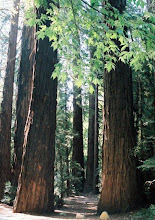Christmas is about change and darkness. God comes to earth and nothing is the same again. The darkness of the broken world is parted with the light of God's love and the promise of new life. The salvation of the world is come. The angels sing! Our hearts are filled with light.
And yet Christmas is also about dramatic change; not just for Mary and Joseph but for us all. Lutheran or not, change is not always easy. The more significant the change, the harder it tends to be for us to accept even when the change is good. We know how to react, what is expected of us, and what will happen when things go the way they always have. Change, even for good, takes that certainty away from us and so we get anxious. Change can bring out the worst in us; almost especially in the Church because we want the church (and God) to stay the same.
When I was in seminary, women students were sent out to do pulpit supply as often as possible, filling in for pastors who were gone for one reason or the other. One Sunday, I showed up to an assignment with not much time to spare. (I am directionally impaired - I have witnesses!) I got out of the car and grabbed my robe and books. I was met by a man who started to reach for the robe saying, "Here, let me get that for your husband". I replied that it was mine but didn't stop to pay much attention. I was more concerned about getting inside and talking to the organist and making sure I knew about the service.
While talking to the organist, a woman came up. Her husband was supposed to read the lessons but was sick, what should she do? I asked her if she would feel comfortable reading the lessons and so she did. Another woman came and was concerned that the information in the bulletin was wrong about the women's meeting that week. I asked her to make that correction during the announcements since I wasn't familiar with the details. I then went on to do the service as discussed, even (with permission as a senior student) presiding at Holy Communion.
As soon as the service ended, the councilmen met me at the back of the church talking about what to do next. The pastor, who had been there many years, insisted that no women were allowed to speak in the church. He didn't believe in the changes being made and said they weren't scriptural. So in this congregation, women didn't read lessons, usher, or even make their own announcements from the pew. And now the seminary had sent them me (I was known as Chris at the time) and their own women had read and spoken too.
Just then, the oldest woman of the congregation came up through the men and grabbed both my hands in hers. With tears running down her cheeks, she spoke. "I am so blessed God sent you here. Now I can die in peace. I have been waiting 98 years for this." Her blessing has kept me strong through the years many times, in places and circumstances where I have been doubted, challenged, and tested. She helped me see that this change I was part of really was from God and had been waited for and prayed for long before I was born. She has been my "Anna".
When the newborn Jesus is brought to the temple, two elderly prophets, Simeon and Anna give thanks to God for letting them see Jesus and the fulfillment of the salvation story. They help Mary and Joseph and us, see this new thing as wonderful and powerful good news. Christ is born! Celebrate the good news of God's love as the holy season of Christmas continues! Read Luke 2:25-38.










